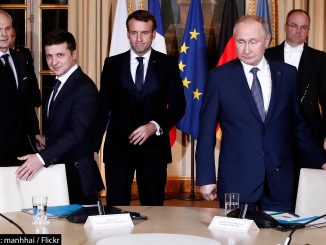Although some have expressed relief that Russian tanks have yet to roll into Ukraine, and taken note of the absence of a Putin rant, and from this concluded that Russia will respond to the events in the country in a patient, benign and constructive way, such a judgment is wildly premature.
The only certainty in the situation currently prevailing in Ukraine is wild uncertainty. And as real options theory teaches, typically the best alternative in such a situation is to wait and see how things develop. Putin may not think explicitly in such terms, but he is a savvy enough customer to understand that fools rush in where angels fear to tread. So I think he is biding his time.
He also realizes that it is best for the supreme leader to remain silent in such circumstances, so as to not commit himself prematurely, and to permit him to keep his future options open.
But his placemen and proxies are shrieking apocalyptic descriptions of the situation in Ukraine, thereby laying the predicate for future Russian intervention of some form. Lavrov has vented to Kerry and European foreign ministers. The Russian Foreign Ministry released a statement roundly condemning in harsh terms the new government in Ukraine and the process by which it took power. Medvedev also sharply criticized the process and outcome by which the opposition seized power. Medvedev also warns that the opposition has threatened Russians and Russian interests. Medvedev and the FM blame the West for meddling and taking a hand in overthrowing the legitimate government of Ukraine.
There are several themes here. Most notably, that the opposition reneged on a duly authorized agreement with Yanukovych, and hence their seizure of power is illegitimate and the government is illegitimate. Moreover, the Russian government officials routinely portray the opposition as balaclava wearing (there’s irony for you!), Kalashnikov brandishing (more irony!) thugs and terrorists and pogromists and tools of the West.
This is all right out of the standard Russian playbook for establishing the justification for armed intervention. Just look at Chechnya (both in 1994 and 1999) and South Ossetia and Abkhazia. They checked all the same boxes then.
I am not saying that the tanks will inevitably roll. But Russia is building the case to justify it. This is also useful in justifying other actions short of war, including particularly economic pressure (embargoes on Ukrainian goods from the entire Eurasian Union, cutoffs of gas and oil).
Yanukovych’s whereabouts are unknown. (As I tweeted Friday: “Where in the world is Victor Yanukovych?”) Current rumor has him in Russian hands.
Putin no doubts despises Yanuk, not least for blowing the management of the situation in Ukraine (though Putin himself is almost surely primarily culpable-but that can’t be admitted, can it?). But he is the elected President of Ukraine, and the Russians will say that he is the only legitimate authority in the country. If they do roll in, Yanukovych will be in their baggage train. Yes, in the event he will be discarded like last week’s leftover fish after he serves his purpose. But right now he is the Russian’s main claim to legitimacy in Ukraine, and they have every interest of keeping him from the hands of the current government, which has indicted him for mass murder.
Things are still extremely fluid. The Maidan has accomplished the easy part. Now the real work begins, and given the debilitating legacy of the Soviet experience, the country’s pervasive corruption, and its lack of any credible institutions, the prospects for a easy transition are bleak indeed. Especially given that this transition will have to take place under substantial Russia pressure of one form or another.
The most pressing difficulty is economic. The country’s debt is crushing, and reserves are short. The US, EU, and IMF have pledged assistance, and their words need to be turned into deeds-and ducats.
One interesting angle here is that Russian banks have a substantial exposure to Ukrainian debt, public and private. That represents a substantial source of leverage of Ukraine and the west, and a very real potential flashpoint in conflict between the new government and Russia.
If there is an online equivalent of writing blog posts in pencil, this is the time to use it. Things are very volatile, and could change quickly. It is precisely this volatility that makes it dangerous indeed to take a lack of Russian action as a sign of Putin’s acquiescence to defeat. As I said the other day, what has just transpired is the end of the beginning. And to mix military aphorisms, Vladimir Putin has not yet begun to fight.
Disclaimer: This page contains affiliate links. If you choose to make a purchase after clicking a link, we may receive a commission at no additional cost to you. Thank you for your support!




Leave a Reply